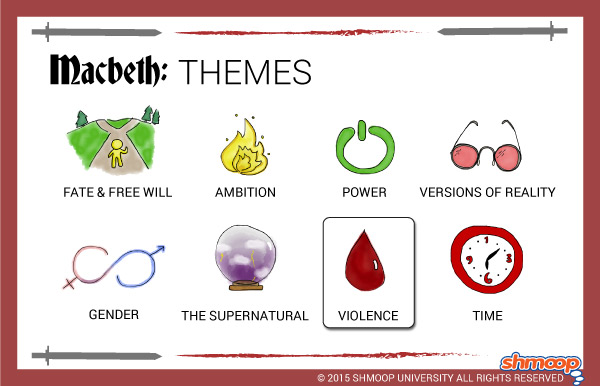 (Click the themes infographic to download.)
(Click the themes infographic to download.)
Do violent TV shows and video games actually make kids more violent? Maybe. But if they do, then you're going to have to lock up Shakespeare with a MA-17+ rating, too, because Macbeth's body count is out of control. And it's not just aliens or zombies being brutally slain: it's women and kids, too. As with all of Shakespeare's tragedies, Macbeth piles on the violence. Just as we ask whether it's necessary or gratuitous in the latest James Bond movie, we can ask the same thing here: is there a good reason for all the violence, or did people in the 17th century like to watch blood being spilled just as much as we do?
Questions About Violence
- Most characters in the play have won their honors on the battlefield. To what degree could you describe politics in Macbeth as a kind of battlefield? Is this political violence acceptable.
- Nature always seems to be rebelling against the unnatural acts going down in Dunsinane, yet violence is a central part of the natural world. Are humans any more than animals here?
- The play ends with as much violence as the original battle against another traitor to the crown. Is there a suggestion here of cyclical and never-ending violence? Is there any way to argue against Macbeth's claim that blood demands blood? And where have all the flowers gone?
- When Malcolm wants to grieve, Macduff tells him instead that violence in the name of Scotland is a better cure. Yet when Macduff finds out his family is murdered, he grieves first before taking revenge. Is violence a justified reaction to a wrong, or is it just an emotion out of control that can be rightfully calmed with thought?
Chew on This
The reason that Macbeth's violence is inexcusable is because it doesn't play by the established rules. In Macbeth, organized violence is sport, and individual violence is uncivilized.
Throughout Macbeth violence and cruelty are associated with masculinity.